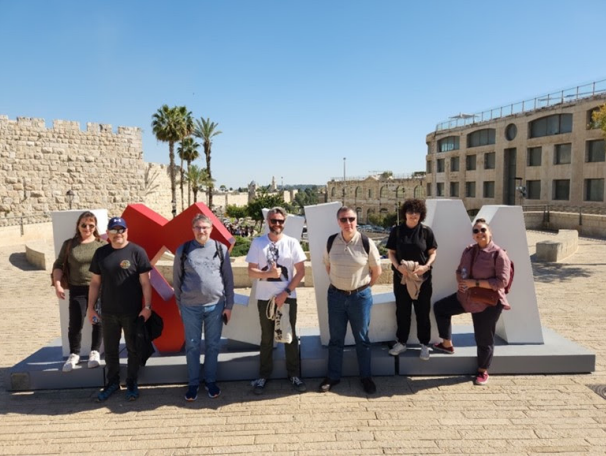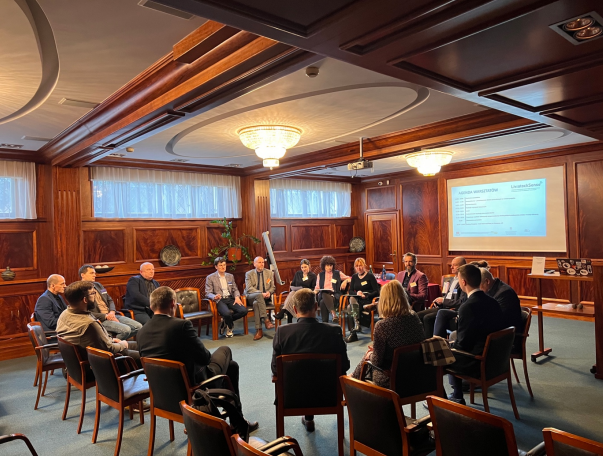The LivestockSense team from UPWr spent Passover and Easter in Jerusalem, Israel, where MIGAL Galilee Research Institute hosted the last consortium meeting of the project with an exciting and eventful itinerary. LivestockSense has a journey of cross-national quantitative and qualitative studies and discussion workshops on how to understand the barriers for adopting intelligent technology in livestock farming to enhance environmental sustainability. Concrete ICT solutions have been applied to pig and poultry farming in different countries to better understand how to enhance the value of digitalization for the individual farmer. An important task is now to develop an ICT tool that will provide farmers with evidence-based recommendations on how to overcome their challenges in regard to the application of Precision
Livestock Farming technologies. After a joint consortium meeting, where great new insightful LivestockSense research was displayed and discussed, the excellent host, MIGAL team, had scheduled some sightseeing of Jerusalem for the following days. The LivestockSense partners were introduced to the beautiful landscape of Israel, the Western Wall, and the tomb of Jesus, while all festivities leading up to the Passover-celebration was going on in the city. This article reports on the result related to the LivestockSense project that received funding from the European Union’s Horizon 2020 research and innovation programme under grant agreement No. 861665 ERA-NET ICT-Agri-Food. The authors acknowledge the contribution of AgHiTech Kft (HU), Institute of Agricultural Economics (HU), Galilei Research Institute Ltd. (IL), SBA Research (AT), and Innvite ApS. (DK), Swedish University of Agricultural Sciences (SE), Wroclaw University of Environmental and Life Sciences (PL), Estonia University of Life Sciences (EE), Aarhus University (DK) and the co-funding of the following
organisations: NRDI Funds (HU), Israel Innovation Authority (IL), Bundesministerium, LRT Fund (AT), GUDP (DK), Ministry of Rural Affairs (EE), The National Centre for Research and Development (PL) and FORMAS (SE).

On 11.03.2023r II edition of discussion workshops related to the use of modern ICT technologies in animal production (Information Communication Technology) was held. The event was organized again by the LivestockSense project team from the Wrocław University
of Environmental and Life Sciences. The discussions were attended by a total of 18 participants (Fig. 1), representing various sectors related to animal production, i.e., ICT developers/ suppliers, farmers, representatives of NGOs and scientists. During the workshops, the participants divided into small groups of representatives of individual sectors (Fig. 2), had the opportunity to raise issues related to with the use of ICT tools, i.e., motivations leading to their installation and use, characteristics of users and what distinguishes them from other employees or farms as well as jointly identify barriers to the implementation of devices and propose ways that may positively affect the dissemination of modern technologies. In order to obtain reliable conclusions, similar events were also organized by other members of the LivestockSense project consortium from Sweden, Denmark, Estonia, Hungary and Israel. The workshop was conducted on the basis of the methodology prepared by the AKI Institute of Agriculture of Economics (Hungary) and the project coordinator, prof. Thomas Banhazi.
Discussion moderators - Ewa Popiela, PhD (poultry section) and Anna Jankowska –Mąkosa, PhD (pig section) – presented their conclusions on the forum, thanks to which all participants had the opportunity to additionally comment on the results of the discussion (Fig.2). The whole event was led by Sebastian Opaliński, assoc. prof., managing the project on the part of UPWr, who acquainted the participants with the goals of the project at the beginning of the meeting and presented the results achieved so far. On the part of UPWr, Academic
approach was represented by prof. Damian Knecht, prof. Robert Kupczyński and prof. Arthur Kowalczyk. Similarly, to the previous edition the event met with very positive feedback from all participants, as it enabled an effective discussion on problems from the perspective of each of the sectors involved in animal production. The LivestockSense project team would like to thank all workshop participants for taking part in the event and the employees of the Wrocław University of Environmental and Life Sciences for their involvement in the organization of the event. For more information about the activities of the LivestockSense consortium, please contact us
and visit the project website. This ar_cle reports on the result related to the LivestockSense project that received funding
from the European Union’s Horizon 2020 research and innova_on programme under grant
agreement No. 861665 ERA-NET ICT-Agri-Food. The authors acknowledge the contribu_on of AgHiTech Kc (HU), Ins_tute of Agricultural Economics (HU), Galilei Research Ins_tute Ltd. (IL), SBA Research (AT), and Innvite ApS. (DK), Swedish University of Agricultural Sciences (SE), Wroclaw University of Environmental and Life Sciences (PL), Estonia University of Life Sciences (EE), Aarhus University (DK) and the co-funding of the following organisa_ons: NRDI Funds (HU), Israel Innova_on Authority (IL), Bundesministerium, LRT Fund (AT), GUDP (DK), Ministry of Rural Affairs (EE), The Na_onal Centre for Research and Development (PL) and FORMAS (SE).

